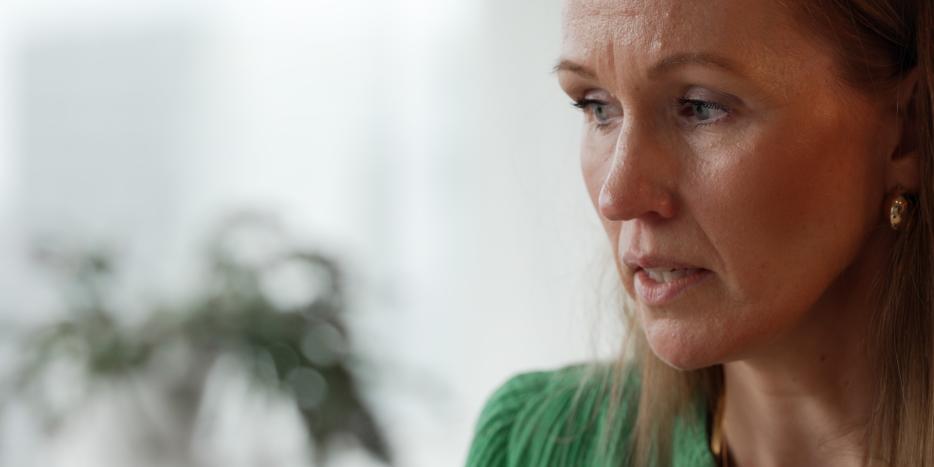The country’s new Minister of Health and Persons with Disabilities fears the consequences if changes are not made in the healthcare sector now. It is time to rethink the whole thing, she says.
– It’s much more serious than I initially thought.
Naalakkersuisoq for Health and Persons with Disabilities, Anna Wangenheim (D), sits in a chair in her new office space on the 4th floor of the tower above Nuuk Center.
A seat she was awarded after the coalition was formed on March 28 – two weeks after the Inatsiartuvält, which was described worldwide as a historic election.
Since then, there has been a lot of rush, and not much time to talk to the press about the responsibility that now rests on her shoulders. Again.
The last time Anna Wangenheim, who is also vice-chair of Demokraatit, was Minister of Health was in 2020.
– It’s something completely different now compared to when I was Minister of Health for the first time. It was during corona, and it was a lot about crisis management, she says.
Now it’s a different job and a different type of crisis that awaits her and her department.
Closed birthing centers, few or no doctor’s appointments out on the coast, a staffing situation that does not meet the requirements at all.
All problems stem from what seems to be the overarching main problem: recruiting and retaining staff.
– We are at the point of no return, says Anna Wangenheim.
– It is so serious that if we do not build our own capacity and make investments now, I can be very worried about what the resulting consequences will be.
Nurses acting as doctors
However, we are already seeing the consequences of a lack of professional skills around the country, points out Anna Wangenheim.
– We have been hearing about recruitment problems for many years. It’s as if it has become the new normal, she says.
During this year’s election campaign, the challenges in the healthcare system were also on the agenda.
Here, KNR spoke, among other things, with the only permanent nurse in Narsaq, Berit Byg, who requested more colleagues.
She described a daily routine where she and her six colleagues wore several caps at work.
– We also have to cover assistant shifts, and at the same time we have to take care of the extra tasks that arise when we don’t have a doctor, said Berit Byg.
– I am very aware of my professional skills, but also my limitations, and I am not a doctor, she said.
The shortage of midwives has also been a problem for many years. In 2002, there were 17 birthing centers. This year, the birthing centers in Qaqortoq and Sisimiut temporarily closed, meaning that there are currently only three.
Must think long term
– Of course, I can’t say anything on behalf of the former coalition, says Anna Wangenheim (D), who has different ideas about why the country has ended up in this situation.
She mentions that it has become more difficult to solve welfare tasks locally as more people move from small towns and villages to larger ones.
She also mentions that the generation of new graduates currently entering the job market has different demands on their workplace than before.
– And this is a new reality that we in the healthcare system must also recognize. Recognize that it requires us to develop the organization in a different way than we have done before, she points out.
In addition, Anna Wangenheim also believes that changing Greenlandic governments and an urge to make a mark with new political initiatives with each change of power have also resulted in an overly short-term health policy.
A trend that she hopes will change now with a broad coalition government and an expanded health settlement.
– Both psychiatry, the elderly and people with disabilities and functional impairments are given a greater place, so that we can create a good solid framework for development, she says and continues:
– And avoid changing zig-zag courses from one election period to the next.
Recruitment from the Philippines
Since the area was taken over in 1992, according to an overview from the Ministry of Health and Persons with Disabilities, around 17 different people have been responsible for health.
When KNR asks Anna Wangenheim (D) why voters should believe that things will change with her at the helm, she replies:
– Because we now have to increasingly recognize that this is an international health crisis and that we need more foreign labor.
Here she is not talking about labor from Denmark, but from third countries where the language is not necessarily Greenlandic or Danish.
– We are so dependent on recruitment from Denmark. I have said several times over the years that we need someone from outside, she says and continues:
– So we have looked at a third country, which Denmark has also looked at – Filipino nurses for example.
A proposal that Anna Wangenheim also toured with during the election campaign in TV and radio debates.
However, one thing is clear for the newly appointed Naalakkersuisoq. It is time to think new and creatively to save the healthcare system from collapse.
The maternity area must be reorganized, and a University Hospital must be established in Nuuk, she mentions.
– We need to change the entire way we work, and now is a good time to do it.
